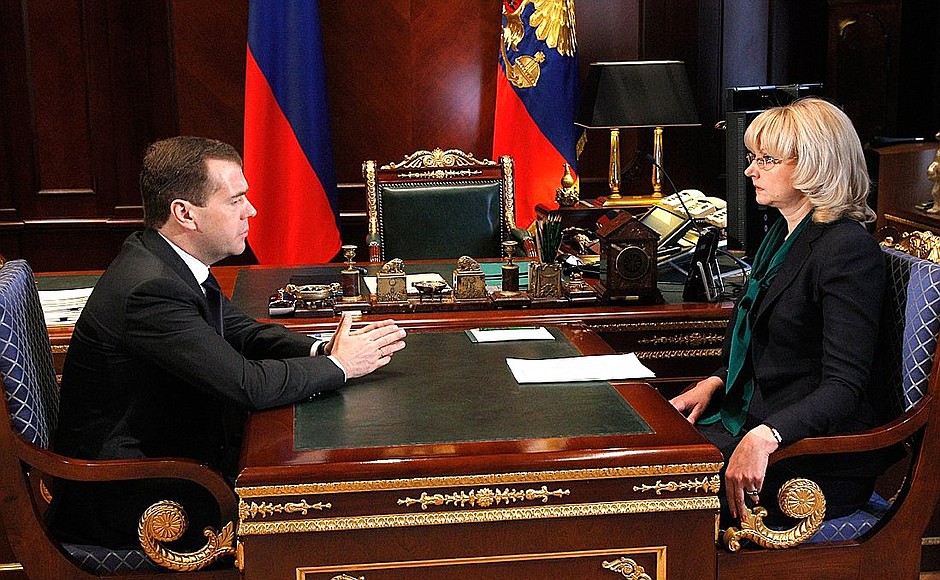
The passenger plane, which was flying from Tyumen to Surgut, crashed during take-off from Tyumen airport, killing 31 people. The aircraft was carrying 43 people in all.
* * *
President of Russia Dmitry Medvedev: Ms Golikova, following this tragic plane crash near Tyumen, we should provide aid and support to the victims’ families, but there are also quite a number of people injured. I want to hear your assessment of their condition and what your ministry and the other ministries are doing. I already spoke this morning with the Emergencies Minister [Sergei Shoigu] and the Governor of Tyumen Region [Vladimir Yakushev].
Healthcare and Social Development Minister Tatyana Golikova: Mr President, following the first emergency call, 19 ambulance brigades have been working at the site, including three disaster medicine brigades.
There were 43 people on board the plane: four crew members and 39 passengers. Sadly, 31 people died in the crash, and 12 were injured and have been taken to two hospitals in Tyumen Region – the First and Second Regional Hospitals. Three of the patients are in very serious condition, and nine are in serious condition. Their injuries include head injuries, broken bones, concussion, serious bruising, and burns.
As at midday, five of the patients had been operated on and are now in the recovery ward. Seven people are being operated on at the moment, and it will be possible to assess their condition once the operations are over.
As for organising aid, right from the moment the news came in, the regional doctors were joined by three brigades from the Federal Neurosurgery Centre in Tyumen: one brigade of neurosurgeons and two brigades of anaesthesiologists. They have gone to the hospitals where the injured were taken to assess their condition and provide any necessary assistance.
See also
Furthermore, the Emergencies Ministry sent a plane from Moscow with seven top specialists, including our burns specialist, Doctor Andrei Alexeyev, who always works in these kinds of tragic situations and will assess the patients’ burn injuries. I think these specialists have already arrived in Tyumen and will soon report on the situation.
Forensic medical brigade are also already at the site. There are 8 regional brigades there, and three of our top specialists from the Central Forensic Medicine Bureau have also flown out there. Just before this meeting began in fact, I got the news that 17 bodies have already been taken from the crash site to the Forensic Medicine Bureau for identification.
We have 22 psychologists out there now: local psychologists and also psychologists from the Emergencies Ministry and Russian Railways.
As I said, operations are currently underway on seven of the injured, and we will hear from our colleagues on their condition when the operations are over. We will have a distance meeting with the Emergencies Ministry to assess the situation, and link-up at the same time with our medical specialists, who can contact their colleagues in Tyumen and make any new decisions on treatment of the injured as might be needed.
As for possible transportation to Moscow if required, this will be something for the doctors there to decide on. The patients are in serious and very serious condition, after all, and the Tyumen specialists are of quite a high level overall. And then there is also our neurosurgery centre, which can provide qualified medical assistance. But if needed, we will work together with our colleagues from Emergencies Ministry here.
Dmitry Medvedev: The immediate decisions have to be left with the doctors of course, as it is they who can assess the patients’ condition. If transport to Moscow is necessary, everything is in place for this – the Emergencies Ministry special plane is already there.
Of course, you are to make full use of the local medical resources. I spoke with the Governor, who said that the best specialists and services are all at work. Of course, we must do everything possible to help the injured people pull through this situation. I realise that their injuries are serious. We are talking about a plane crash after all, the kind of situation in which injuries are always very serious, but our medical services are of a good standard now, and we must do our very best here.
Of course, the Government and the regional authorities must also take the necessary decisions regarding support for the victims’ families and the injured.
Tatyana Golikova: The Aviation Code sets out the provisions on payments and compensation. The Employment Service is now in the process of working out who, among those on board, would be defined as performing their employment duties. Their employers and the Social Insurance Fund will make one-off and monthly payments and payments to cover funeral costs accordingly once the death of those concerned is officially confirmed.
Dmitry Medvedev: All of this must be done without any delay.
<…>